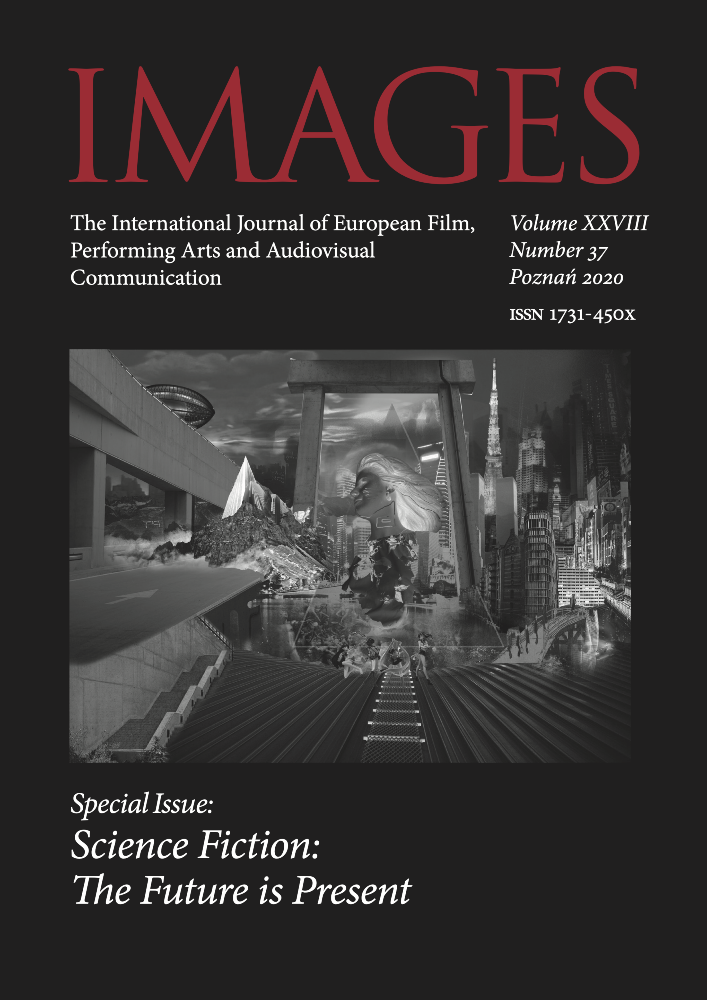Abstract
The subject of the analysis in this article are three films by Bong Joon-ho: The Host (2006), Snowpiercer (2013) and Okja (2017), considered from the posthumanist perspective. A starting point is Donna Haraway’s suggestion that science-fiction stories should be treated as a tool for speculative thinking. Then, I point to the way the Korean film director demonstrates his critical reflection on the effects of climate change, deepening economic inequalities, the impact of global capitalism and the biopolitical model of the governance. The main aim is to seek out the possible strategies of resistance which enable humans to change their attitude to other species (Okja) and to ask a question about the scope of human freedom, the effects of our interference in the functioning of the biosphere (Snowpiercer) and the results of genetic modifications of animals.
References
Agamben G., Homo sacer, przeł. M. Salwa, Warszawa 2008
Andersen G., Nielsen E.B., Biopolitics in Snowpiercer, Elysium, and Interstellar, „The Journal of Popular Culture” 2018, vol. 51, nr 3
Bakke M., Między nami zwierzętami. O emocjonalnych związkach między ludźmi i innymi zwierzętami, „Teksty Drugie” 2007, nr 1–2
Bakke M., Posthumanizm: człowiek w świecie większym niż ludzki, [w:] Człowiek wobec natury – humanizm wobec nauk przyrodniczych, red. J. Sokolski, Warszawa 2010
Banerjee S.B., Necrocapitalism, „Organization Studies” 2008, vol. 29, nr 12
Baratay É., Zwierzęcy punkt widzenia. Inna wersja historii, przeł. P. Tarasewicz, Gdańsk 2014
Bednarek J., Życie, które mówi. Nowoczesna wspólnota i zwierzęta, Warszawa 2017
Bednarek J., Życie jako moc deterytorializacji. Pragnienie-produkcja i żywa praca – Deleuze i Guattari, „Praktyka Teoretyczna” 2011, nr 2–3
Bińczyk E., Epoka człowieka. Retoryka i marazm antropocenu, Warszawa 2018
Bińczyk E., Idea wspaniałego antropocenu: wrogie przejęcie czy antropodycea?, „Prace Kulturoznawcze” 2018, vol. 22, nr 1–2
Braidotti R., Po człowieku, przeł. J. Bednarek, A. Kowalczyk, Warszawa 2014
Canavan G., „If the Engine Ever Stops, We’d All Die”: Snowpiercer and Necrofuturism, „Paradoxa” 2014, vol. 26, nr 1
Derrida J., Heidegger’s Hand (Geschlecht II), [w:] J. Derrida, Psyche. Inventions of the Other, vol. II, Stanford 2008, s. 34.
Derrida J., O apokaliptycznym tonie przyjętym niedawno w filozofii, przeł. I. Bruszkowska, K. Wojtasik, [w:] J. Derrida, O apokalipsie, Kraków 2018
Derrida J., Points... Interviews 1974–1994, Stanford 2002
Derrida J., Provocations: Forward, [w:] J. Derrida, Without Alibi, Stanford 2002
Donaldson S., Kymlicka W., Zoopolis. Teoria polityczna praw zwierząt, przeł. M. Wańkowicz, M. Stefański, Warszawa 2018
Foucault M., Historia seksualności, przeł. B. Banasiak, K. Matuszewski, Warszawa 1995
Foucault M., Trzeba bronić społeczeństwa, przeł. M. Kowalska, Warszawa 1998 Guattari F., The Three Ecologies, London, New Brunswick 2000
Haraway D.J., Anthropocene, Capitalocene, Plantationocene, Chthulucene: Making Kin, „Environmental Humanities” 2015, vol. 6, nr 1
Haraway D.J., Manifest gatunków stowarzyszonych, przeł. J. Bednarek, [w:] Teorie wywrotowe. Antologia przekładów, red. A. Gajewska, Poznań 2012
Haraway D.J., Modest Witness@Second_Millenium. FemaleMan©_Meets_Onco-MouseTM: Feminism and Technoscience, New York, London 1997
Haraway D.J., Staying with the Trouble. Making Kin in the Chthulucene, Durham 2016
Hardt M., Negri A., Rzecz-pospolita. Poza własność prywatną i dobro publiczne, przekład zbiorowy, Kraków 2012
Hsu H.L., The Dangers of biosecurity: The Host (2006) and the geopolitics of outbreak, [w:] Eco-Trauma Cinema, red. Anil Narine, New York 2015
Jeong S., Snowpiercer (2013): The post-historical catastrophe of a biopolitical ecosystem, [w:] Rediscovering Korean Cinema, red. S. Lee, Ann Arbor 2019
Lee F., Manicastrib S., Not all are aboard: Decolonizing exodus in Joon-ho Bong’s Snowpiercer, „New Political Science” 2018, vol. 40, nr 2
Lee M., Monstrosity and humanity in Bong Joon-ho’s The Host, „Positions” 2018, vol. 26, nr 4
Mbembe A., Polityka wrogości, Nekropolityka, przeł. K. Bojarska, Kraków 2018
Paik P.Y., The Host (2006): Life in Excess, [w:] Rediscovering Korean Cinema, red. S. Lee, Ann Arbor 2019
Parr A., Deterritorialisation, reterritorialisation, [w:] The Deleuze Dictionary, red. A. Parr, Edinburgh 2010
Singer I.B., Korespondent, [w:] I.B. Singer, Seans i inne opowiadania, przeł. G. Kurzątkowska, Gdańsk 1993
Smuts B., Rozważania, [w:] J.M. Coetzee, Żywoty zwierząt, przeł. A. Dobrzańska-Gadowska, Warszawa 2004
Sontag S., Katastrofa w wyobrażeniu, przeł. A. Skucińska, [w:] S. Sontag, Przeciw interpretacji i inne eseje, Kraków 2012
Streeby S., Imagining the Future of Climate Change: World-Making Through Science Fiction and Activism, Oakland 2018
Sugiera M., Nieludzie. Donosy ze sztucznych natur, Kraków 2015
Sugiera M., Borowski M., Sztuczne natury. Performanse technonauki i sztuki, Kraków 2016
Virno P., Virtuosity and revolutions: The political theory of exodus, [w:] Radical Thought in Italy, A potential politics, red. P. Virno, M. Hardt, Minneapolis 1996
Wolfe C., Animal studies, dyscyplinarność i post(humanizm), przeł. K. Krasuska, „Teksty Drugie” 2013, nr 1–2
Żylińska J., Bioetyka w epoce nowych mediów, przeł. P. Poniatowska, Warszawa 2013
License
Copyright (c) 2020 Krzysztof Loska

This work is licensed under a Creative Commons Attribution 4.0 International License.

